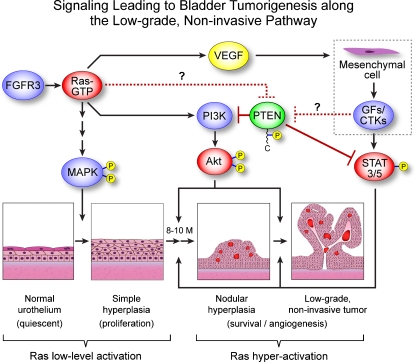Fig. 1.
Dosage-dependence in the activation of ras pathway effectors leading to low-grade, non-invasive urothelial tumorigenesis in the transgenic mice. Low-level urothelial expression of an activated Ha-ras primarily induces MAPK pathway components and urothelial hyperplasia, without provoking urothelial tumors. However, doubling the activated Ha-ras transgene dosage hyper-activates Akt and STAT pathways, resulting in low-grade, non-invasive urothelial tumors. STAT activation may be caused by growth factor (GFs) and cytokines (CTKs) during epithelial/mesenchymal interaction and/or by the functional inactivation of PTEN through C-terminal phosphorylation. Mutations in fibroblast growth factor receptor 3 (FGFR3), which is known to constitutively activate ras GTPase, are likely to transmit signals and induce urothelial tumors in a similar manner. This figure was reprinted with permission from Ref. 46

